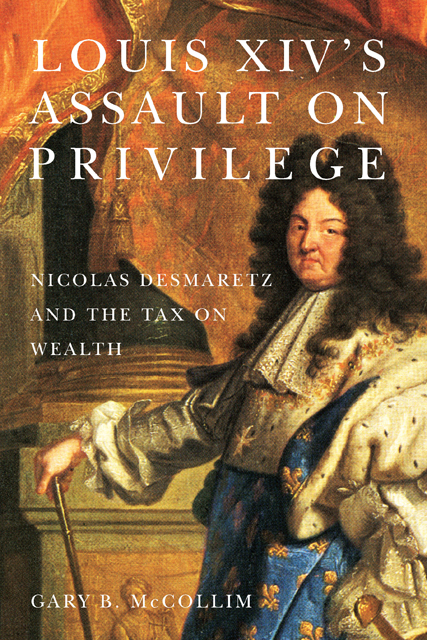Book contents
- Frontmatter
- Dedication
- Contents
- List of Illustrations
- Preface
- List of Abbreviations
- Introduction
- 1 The Fiscal System under Louis XIV
- 2 The Rise of the Administrative Monarchy
- 3 Nicolas Desmaretz and Company
- 4 Handling Ideas for Reform
- 5 The Establishment of the Dixième
- 6 After the Dixième
- Conclusion
- Appendix 1 The Conseil d’en haut, or the Council of Ministers
- Appendix 2 Members of the Royal Council of Finances under Louis XIV
- Appendix 3 Controllers General, Directors, and Intendants of Finances
- Appendix 4 Glossary of Terms
- Notes
- Bibliography
- Index
- Frontmatter
- Dedication
- Contents
- List of Illustrations
- Preface
- List of Abbreviations
- Introduction
- 1 The Fiscal System under Louis XIV
- 2 The Rise of the Administrative Monarchy
- 3 Nicolas Desmaretz and Company
- 4 Handling Ideas for Reform
- 5 The Establishment of the Dixième
- 6 After the Dixième
- Conclusion
- Appendix 1 The Conseil d’en haut, or the Council of Ministers
- Appendix 2 Members of the Royal Council of Finances under Louis XIV
- Appendix 3 Controllers General, Directors, and Intendants of Finances
- Appendix 4 Glossary of Terms
- Notes
- Bibliography
- Index
Summary
The study of fiscal-policy formation in the age of Louis XIV cannot be undertaken lightly or briefly, unfortunately for the reader. There are too many subjects that require explanation, such as royal finances, the King’s Council, the royal court, the relationship between the royal government and its critics, etc. Wherever possible, I have tried to eliminate topics that seemed extraneous or that threatened to lead to discussions with only a tangential relationship to the theme of this book. It is for this reason that I have neglected any discussion of “mercantilism,” an anachronistic term that appeared in the late eighteenth century and has prevented any objective discussion of the financial system and policies of the Old Regime in France. The control of commerce was more an evolving set of policies inherited from the medieval past than a conscious macroeconomic policy of the royal government. Kings inherited trade barriers and duties. They did not invent them. If anything, the royal government sought to suppress these barriers but the circumstances of foreign policy and provincial reluctance to go along with the crown prevented anything but the most inconsistent pursuit of this aim.
A second reason for avoiding this debate is that this book focuses on finances rather than commerce. The latter is considered only insofar as it involves the problem of increasing government revenues. For all practical purposes, commerce is not a part of this study.
There is the matter of the spelling of proper names of the many characters involved in royal finances under Louis XIV. The seventeenth century did not have any standard rules for spelling. Many historians have chosen to modernize the spelling of seventeenth-century names. In each case I have adopted the practice of employing the orthography used by the person himself so that researchers who examine original documents from the period will be able to determine the identity of an author by looking at the spelling of his name. For instance, many historians call Louis XIV’s last finance minister Desmarets while the man himself spelled his name Desmaretz. Contemporary spelling varied from Desmarest to Desmarais to Des Marets, but I have chosen to spell his name as he spelled it. I follow the same practice with Delacroix and Dubuisson, who were often referred to by contemporaries as de la Croix and du Buisson.
- Type
- Chapter
- Information
- Louis XIV's Assault on PrivilegeNicolas Desmaretz and the Tax on Wealth, pp. ix - xPublisher: Boydell & BrewerPrint publication year: 2012

